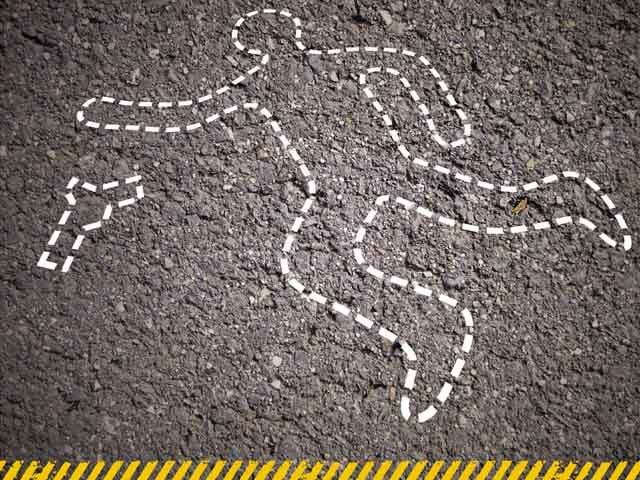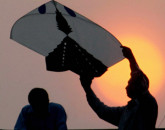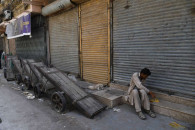The death hunters
Shehroz took out his phone... on the screen was a snapshot of the body parts he had collected earlier in the day.

Wanting to investigate violence in Karachi, I had planned on spending time with Shehroz, an 18-year-old emergency professional, at the Edhi centre in Tower, II Chundrigar Road. The city was going through a spell of target killings, just after the by-elections of PS-94. In the absence of law enforcement agencies, spending a few days with an Edhi worker was the best way to visit sensitive areas.
Speeding into a lane ahead of Keamari, Shehroz picked up the hand set on the radio set.
“Confirm location, confirm location. I’m in Keamari,” he said.
“You’re in the right area. Please search; there’s no confirmed location.” A voice replied from the other side.
Shehroz went from one lane to another with his designated driver, Nadeem, looking for the victim but the search was futile. It had been a false alarm.
Shehroz called off the search and Nadeem turned the ambulance around. We were on our way back to the centre.
“Does this happen a lot?” I asked him.
“Yes,” he replied. “But we have to check all calls — that’s our job.”
“How many calls did you attend to today?”
“I don’t keep an exact count, but on an average, I go for five to six calls a day,” he replied. “It totally depends on the city’s situation. Today, for example, I had to go to the same locality in Lyari quite a few times to collect different parts of the same body. We found the head first, then the torso and later the arms and legs.”
Shehroz took out his mobile phone and handed it to me. On the screen was a snapshot of the body parts he had collected earlier in the day. I had barely asked if he had more such photos when he eagerly started showing me other albums of his assignments. I stared at the unspeakable horror and gore, repulsed yet fascinated.
As midnight approached, we waited for more calls.
“How’d you land up with this job?” I asked him.
“I came in as a call centre operator but now I do everything here,” he said.
A couple of hours had gone by without any calls. There were reports of killings in different parts of the city. The death toll had gone up to 12 in the last 10 hours. The total body count was over 50 now. Meanwhile, Shehroz and I chatted about the politics of ethnic-sectarian violence, about area holdings, “bhatta” and the extortion business.
As his duty hours drew to a close, Shehroz suggested that we visit the morgue and see the bodies he had picked up that day. He was interested in showing me the body parts he had collected and which had now been sewn up at the Edhi morgue near Super Highway.
At the morgue, the stench was unbearable — a sharp metallic smell, the stale stench of congealed blood. In the cold storage area were the uncovered heads, open eyes and empty gazes of the dead.
Day 2
The next day, October 18, the city wore a different air. I called Shehroz as he was getting ready to go to work, asking him if the city was violent. Surprisingly, he said it wasn’t. The PPP was out in full force to mark the Karsaz bombings and the arrival of Benazir Bhutto three years ago. The city was peaceful because the leaders of PPP were making sure that the police stayed vigilant.
Day 3
It was around 7 pm when I heard from Shehroz. News had come in that there was a massacre at the Shershah market, with at least 12 people dead. Meanwhile, I was at a product launch, invited by the fashion doyenne Frieha Altaf. As we were leaving the fashion show, my phone rang and on the other end was Shehroz. He was in a hurry.
“Taha, get to Civil [Hospital]. I’ve just picked up three gunshot victims from near Radio Pakistan,” he shouted.
As I drove on the empty streets of Karachi, the city seemed paralysed. It felt as if it was late in the night though it was just 8 pm.
At the hospital, I went up to an Edhi official and asked for Shehroz. He appeared a few minutes later and asked me to follow him inside the mortuary.
“I picked up three bodies just half an hour ago,” he said. “They were lying on top of each other on the side of the road.”
There was the same metallic smell and dried blood on the floor that we walked on. Around the bodies was a bunch of men (police officers, I was told later) inspecting the bodies and taking notes. The victims had all been men in their early thirties.
“Taha, look at this one,” said Shehroz, touching the forehead of a victim. “He’s been shot in the head at close range... “
Right in the middle of the forehead, there was a bullet hole.
“Aren’t you bothered with all this violence?” I asked Shehroz.
“I am used to it,” he shrugged.
There was emergency at Edhi that day, and he had gotten instructions from his head office to stand by at the hospital since there was a strong possibility that they would have to pick up more bodies. The death toll for that day stood at 17 in the last 12 hours.
I decided to stay with Shehroz and soon we were off to Malir where there was an exchange of fire between two groups and casualties were expected.
The streets were quiet and it looked as if someone had sucked the life out of the city. After reaching a point in the lair of streets in a neighborhood, the ambulance driver stopped next to a police mobile.
“We can’t go any further,” he said to me.
Curiosity is a dangerous trait, I decided to scout the area. I walked up to a lone police mobile standing in one corner and asked one of the policemen what was going on.
“There’s firing ahead, sir. Don’t go,” he said.
“What seems to be the problem?” I asked him.
“Sir, we’re waiting for orders, we may have to carry out an operation,” he said.
Right then, my phone rang. It was Shehroz.
“We have a gunshot case in Korangi. We are moving there,” he said.
“Okay, I’m coming,” I replied and hung up.
As we sped to Korangi, the details started pouring in. There had been firing at a camp for flood victims and three people were reported to be injured. We were in Korangi in 20 minutes or so, but as we were about to enter the lane where the incident had taken place, we saw ambulances driving out of the area.
The injured had already been taken to the hospital. One of the victims had succumbed to injuries and residents of the camp were protesting with the body. An Edhi ambulance already accompanied the protestors so Shehroz decided not to go. He called in at the headquarters and was told to go back to Malir.
We reached the spot we were at earlier and Shehroz got a call from the HQ informing him about a body that had been brought to the police station nearby. We went to Al Falah Police Station, where the call had come from.
The victim was a boy in his late teens. Shehroz checked the body and showed me the bullet wound. The boy had been shot in the chest, close to the heart. Shehroz and his helpers loaded the body onto the ambulance and minutes later we were speeding to the hospital.
At Jinnah’s emergency ward 20 minutes later, the doctor on duty declared the victim dead and referred us to the nearby morgue. A little while later, the father of the dead boy arrived. Inside the morgue, I could smell the same metallic stench of blood and hear the cries of the father.
At 3 am, Shehroz called it a day, and invited me to dinner with his family the next day.
DAY 4
I reached Shehroz’s locality around 5 pm. Lyari is one the most notorious neighborhoods in Karachi and Shehroz came outside on the main road to receive me. Through a labyrinth of narrow lanes, we came to a four-storey building where Shehroz lived.
He introduced his parents and his two younger siblings, a 16-year -ld sister and a 14-year-old brother. His mother went to make tea for us while his father started chatting.
After a round of tea, I asked his father about his son’s work. “Do you like what he does at his age?” I inquired.
“Yes and no,” He said. “We need the money so he has to work.” “But I have no words for the kind of work he does,” he added.
“So what was your reaction the first time he came home and told you about picking a dead body?” I asked.
“We were shocked. We wanted to tell him how scared we were, but if we’d done that, our son would have been shattered.”
Later, I had a talk with his sister. “It is scary but someone has to do the job,” she said about her brother. “Shehroz shows me the pictures every time he comes home.”
It was almost night fall when Shehroz’s phone started ringing again. There was an emergency in the city once again and they were calling him to work.
Minutes later Shehroz was on his way.
Published in The Express Tribune, November 21st, 2010.



















COMMENTS
Comments are moderated and generally will be posted if they are on-topic and not abusive.
For more information, please see our Comments FAQ